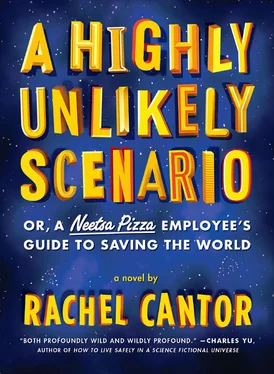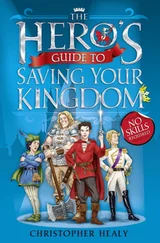(The food preferences of the Leader were, in the interests of National Unity, a well-kept secret.)
I didn’t know, Leonard said, but he wasn’t worried: Neetsa Pizza’s concerns were eternal, not political: how to live the moral life, the unity underlying all manifestation. The Leader was undoubtedly aware of this.
You didn’t know about the menus, did you? Carol said. I thought not. When was the last time you left the house?
I leave the house every day, as you well know, Leonard said — for at 3:23 p.m. each day Leonard walked to the corner of Boise and Degas to pick up Felix, whom he cared for after school in exchange for living rent-free in Carol’s garage apartment, without which he would have been Out in the World Alone.
I don’t mean the corner, Carol said.
I don’t need to leave the house, Leonard said, and he didn’t. He was perfectly fulfilled in his White Room, and joyous in his Life Plan, which was to heal clients-in-pain. It was a good life, its pieces fitting together like the double crust on Carol’s Chicken-in-Every-Pot Pie.
You need to leave the house, Carol said, fastening her tartan apron around her pleated steep pants. End of discussion. FELIX!
A breathless boy arrived, bedecked in black-trimmed red toreador pants and holding a junior clutchbag. His red afro was disheveled and he looked vaguely worried. This was Felix.
Go, Carol said. Don’t believe a word your teachers tell you.
Three twenty-three, Leonard said.
Felix nodded all-purposefully, then ran to catch his caravan.
A good egg
After Carol left, Leonard helped himself to haggis tarts, smuggled (as a form of revolutionary sabotage) by his sister from Jack-o-Bites. He checked that his White Room was perfectly white, then fretted about his missing complaints, Medusa on his lap.
He fell asleep on his swirly chair and dreamed of his grandfather. The old man smelled of herring and was holding an improbably tall stack of leather-bound books.
Boychik, the old man said. You’re a good egg. I need you to listen good.
No problem, Leonard said. I’m a Listener. What’s it like being dead?
You’re not listening, his grandfather said. I need you to listen good.
Oh, Leonard said. I miss you. There was something I needed to tell you, I forget what.
It is time for you to save the world, his grandfather said. I need you to do this one thing for me. Boychik, are you listening?
Gosh, I’m glad to see you! Leonard said.
The world, boychik! You need to save the world!
Are you holding my calls, Grandfather? Somebody’s holding my calls. I’m worried I’ll lose my job — then what’ll I do?
But that wasn’t what he’d wanted to say. It was important, whatever it was.
Calls, shmalls! his grandfather said. I need you to listen!
Leonard remembered what it was.
I’m sorry, he said, extending his hand, but his grandfather was gone.
His family obligations
That afternoon, still thinking about his dream, Leonard brought a cup of chicory to the corner. Felix was too old by half to be met at the caravan, but he liked seeing Leonard half a block away — looking off, as if arrested by a compelling thought, his green army pants suavely sweeping the ground, his brown afro shining in the sunlight. On his way to the corner, however, Leonard was stopped by six policemen carrying sniper muskets and wearing yellow sashes that read CHIPMUNK PATROL .
Chipmunk Patrol?
They asked if Leonard was skulking, reminded him that the webcam was always watching, offered him a pamphlet of inspiring homilies by the Leader.
He took two. No, better yet, three! As one, the Chipmunk Patrol squinted meaningfully, then walked away, looking at Leonard again over their collective shoulders.
The caravan arrived, discharging Felix. No black eye this time, but his toreador pants had been soiled. The municipal compost heap: it happened nearly every day.
Between the corner and home — territory officially known as the Time between Here and There — Felix was required to tell Leonard anything not-good that happened at school. So he wouldn’t have to bring it home. On this day, head hanging low, Felix merely said, Do you think they’re salvageable? Meaning his pants.
I have a surprise for you, Leonard said.
Is it …?
You’ll see, Leonard said. Already the boy’s face had brightened.
Shall we run? Felix asked.
We shall! Leonard said.
The letters are dancing
Once home, Leonard put Felix’s toreador pants into the steam-cleaner, then gave him ginger ale in a chilled beer stein and precisely two peanut-butter jam squares. Then he supervised five minutes of awesome karate kicks, after which Felix pronounced himself knackered and ready for a story.
Leonard wasn’t good at stories. In the early days, when Felix clambered onto his lap, Leonard would say, Once upon a time …, and Felix would say, What? What? and Leonard would say, There lived …, and Felix would say, Who? Who? thus creating an artificial suspense that ultimately proved unsatisfying. What Leonard quickly learned was that Felix was very good at stories, so much so that all Leonard had to say was, Who should our story be about today? and Felix would say, A beautiful princess named Celeste! and Leonard would say, Oh, and where does Celeste live? and Felix would say, In a great wooded land surrounded by beasties! and Leonard would say, Beasties, oh my! and Felix, his pale cheeks pinkening, would say, They’re horrible! They dump boys onto the municipal compost heap! and on it would go.
After storytelling, if Felix wasn’t too knackered, he would work on his opus, a finely drawn comic-book retelling of “Leonard’s” stories. He was patient and careful, finishing no more than three or four panels per day, his retelling of the story always an improvement on the telling itself.
Don’t you want your surprise? Leonard asked after the awesome karate kicks.
The White Room! Felix had forgotten!
Every sixty days, the seal to Grandfather’s closet popped open and Leonard allowed Felix into the White Room. Felix put on a white overshirt and either his white toreador pants or white Laplander shorts, depending on the weather. Once in the Room, the boy would say a charm of his own devising, then close his eyes and pick a book at random. Then he’d sit on Leonard’s lap and balance the book on their four knees. Leonard had no use for books — they reminded him of school, which he left at fifteen after learning about little other than the life of the Leader, and hygiene, both physical and social. He’d even less use for his grandfather’s morocco-bound books, which were heavy and written in a language Leonard couldn’t understand. Felix, however, seemed to have a feel for them.
Most of the books they “read” contained a central text in Hebrew, surrounded by columns also in Hebrew but in a smaller hand.
Not Hebrew, Felix said. Aramaic. It’s called the Talmud, which is actually a lot of books. I asked the Brazen Head.
Felix was always asking things of the Brazen Head. Like Leonard, Felix enjoyed his screen time, when his mother allowed it. When Carol told him to go outside and play, he swung halfheartedly on a creaky safety swing till he was allowed back in. When he was younger she used to organize play dates with proletariat children, but in their vigorous class-based outrage they, like his middle-class chums, were often moved to throw Felix onto the municipal compost heap. Peasant children were no better. Carol reckoned she didn’t have time for all that laundry.
Sure you’re not provoking them? she’d asked.
They say carrot tops belong with carrot tops.
And what do you say to that?
Читать дальше












